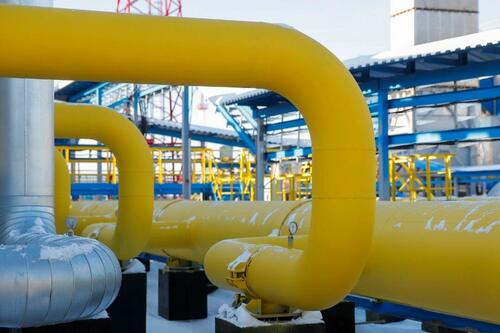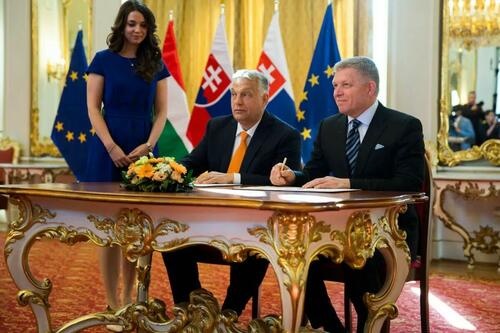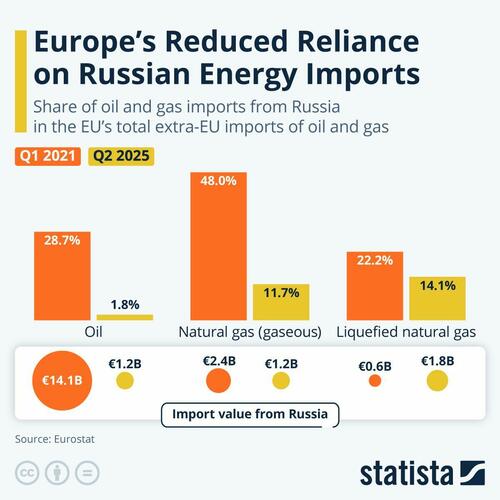EU Energy Ministers Want To Finish Ditching Russian Gas In Two Years
European Union energy ministers think they’ll be able to phase out the import of Russian gas by 2028, and have backed a proposal that would begin the process by phasing out the contracts themselves for both pipeline gas and liquefied natural gas (LNG) by Jan. 1, 2026.

Current agreements may continue until June 17, 2026, while long-term contracts may would be cut off on Jan. 1, 2028.
That said, landlocked members states (Hungary, Slovakia) which have limited alternatives to Russia would be afforded some flexibility.
If the proposed regulations are backed by the European Parliament, it would require member states to submit plans for how they will diversify their energy supplies if they’re currently receiving (directly or indirectly) gas from Russia.
Composed of national ministers from each member state, the Council of the EU said in a press release, “The same requirement to submit a national diversification plan will apply to those member states that are still importing Russian oil, with a view to discontinuing those imports by 1 January 2028.”
Danish minister for climate, energy and utilities, Lars Aagaard, said “An energy independent Europe is a stronger and more secure Europe. Although we have worked hard and pushed to get Russian gas and oil out of Europe in recent years, we are not there yet,” adding that it’s critical for Denmark – which currently holds the rotating presidency of the Council of the EU, secures “overwhelming support from Europe’s energy ministers for the legislation that will definitively ban Russian gas from coming into the EU.”
The Council presidency will begin negotiations with European Parliament (720 lawmakers) before agreeing on the final text of the regulations.
In other words – two years will have come and gone by the time they’re done talking…
That said, Europe has already significantly cut back on Russian gas;
Between Q1 2021 and Q2 2025, the EU-27 reduced Russian oil imports by more than 90 percent, cutting the share of Russian oil in total extra-EU imports from 29 percent to less than 2 percent. During the same period, Russia’s share of the EU’s natural gas imports dropped from 39 to 13 percent, driven mainly by a 52-percent reduction of natural gas imports in gaseous state. The value of liquefied natural gas imports from Russia actually almost tripled between Q1 2021 and Q2 2025 but still accounted for a smaller share of the EU’s total LNG imports in the most recent quarter. This is due to total LNG imports more than quadrupling during this period, as the EU replaced Russian pipeline gas with LNG from suppliers like the United States, Qatar and Norway. -Staista
As the Epoch Times notes further, when it comes to Hungary and Slovakia:
Following the 2022 Russian invasion of Ukraine, the EU has sought to reduce its dependence on energy from Russia. According to an explainer on the European Council’s website, “Russia’s share of EU imports of pipeline gas dropped from over 40 percent in 2021 to about 11 percent in 2024.”
In 2024, Russia accounted for less than 19 percent of the EU’s imported gas and LNG combined.
While much of Europe has moved away from Russian energy and Brussels has imposed extensive sanctions on most Russian oil imports, Slovakia and Hungary still receive Russian supplies via the Druzhba oil pipeline.
Bratislava and Budapest maintain closer ties with Moscow than the rest of the bloc and have defended their continued purchase of Russian oil, saying alternatives are too expensive.
Hungarian Prime Minister Viktor Orban has repeatedly called for the EU to drop its plan to stop Russian energy from being imported, and his environment minister, Aniko Raisz, echoed those sentiments on Sept. 18.
“I think you know our position. We are one of the few landlocked countries in the region. So, our position has always been guided by the energy security for Hungary,” Raisz told reporters in Brussels.
“We know that we have important, important tasks ahead of us, but let’s not daydream.”

Last month, Slovakia pushed back on U.S. President Donald Trump’s calls for Europe to curb Russian oil imports.
“We don’t have any other options which could be sustainable and also for the price to be reasonable,” Slovak Foreign Minister Juraj Blanar told Reuters during an interview on the sidelines of the U.N. General Assembly on Sept. 24.
“It takes time to diversify this. So that’s why we are calling for some kind of empathy.”
Hungarian Foreign Minister Peter Szijjarto said on Sept. 24 that the country will not stop buying Russian oil.
“We are a landlocked country,” Szijjarto told ATV television in an interview in New York City, where he was also attending the U.N. General Assembly. “It would be great if we had access to the sea; we could build an oil refinery or an LNG terminal on the coast and cover the entire world market. But that’s not the case.”
Guy Birchall and Owen Evans contributed to this report.
Tyler Durden
Tue, 10/21/2025 – 04:15ZeroHedge NewsRead More





 R1
R1
 T1
T1


